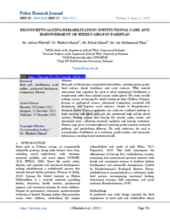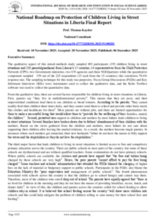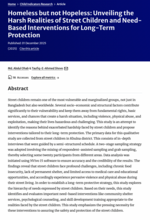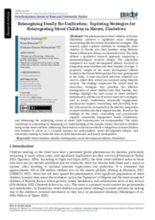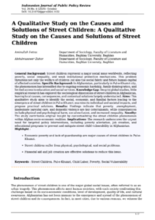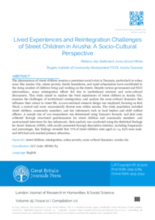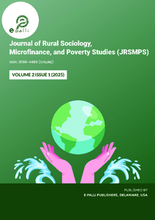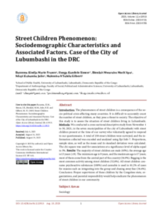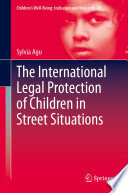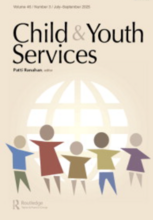Displaying 1 - 10 of 228
This study examines whether institutional rehabilitation for street girls in Pakistan is genuinely transformative by assessing services at the Zamung Kor Model Institute through a gender- and child-centred lens. While findings show improvements in safety, emotional regulation, and educational engagement, persistent gaps in trauma-informed care, vocational pathways, and post-discharge support highlight the need to reconceptualize rehabilitation as a continuous, community-linked process.
This mixed-methods study, drawing on qualitative and quantitative data from all 15 counties in Liberia, examines the drivers and scale of children living in street situations through interviews with children, parents, government, UN, and civil society actors.
Street children in Bangladesh face chronic food insecurity, unstable shelter, limited access to health and education, and pervasive violence and abuse, as revealed through qualitative interviews with twenty children in Khulna district. Based on the hierarchy of needs expressed by the children, the study identifies essential long-term protection interventions, including community shelter services, psychological counseling, and skill-development training, and underscores the urgent need to implement these measures to ensure their safety and well-being.
This study examines strategies for reintegrating street children in Harare, Zimbabwe, into their families, highlighting the root causes of homelessness and the need for psychosocial support, counselling, family conferences, and community engagement. It emphasizes innovative, evidence-based approaches to ensure effective family reintegration and informs policymakers, social development officers, and researchers addressing child homelessness.
This study explores the social, economic, and familial factors contributing to the rise of street children in Pul-e-Khumri, Afghanistan, where poverty, unemployment, and family breakdown have deepened the crisis. By highlighting the severe individual and societal impacts, it calls for targeted policies—such as poverty reduction, job creation, and access to education—to address the root causes and protect vulnerable children.
This study examines the experiences of street children in Arusha City, Tanzania, highlighting the challenges they face due to poverty, family breakdown, and rapid urbanization. Findings show that most street children are boys aged 10–14 with only primary education, and reintegration efforts often fail because of institutional mistrust and socio-cultural barriers.
This study examines the challenges African governments face in integrating orphaned and vulnerable children into orphanages and home-based care facilities, with a focus on Zambia. Findings reveal major barriers including insufficient funding, unregistered orphanages, poor coordination with NGOs, cultural factors, and the attitudes of the children themselves.
This study assessed the situation of street children in Lubumbashi, DRC through a survey of 250 children across the city’s seven municipalities in November 2021. The findings highlight the urgent need for stronger state involvement, organizational support, and parental responsibility to address and reduce the phenomenon of street children.
This book offers a comprehensive and rights-based legal framework addressing the unique challenges faced by children living on the streets. The book delivers a detailed analysis of international legal instruments—both binding treaties and relevant “soft law”—to clarify how they apply to such children.
Street-connected children in Ghana face systemic marginalization, requiring comprehensive interventions at the family, community, and policy levels. Based on insights from 12 social workers, this study highlights micro-, mezzo-, and macro-level strategies to reduce the number of street-connected children and support their reintegration into society.

